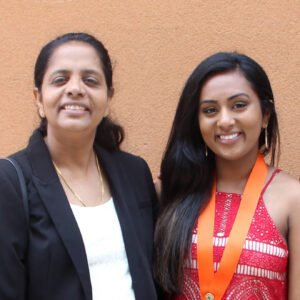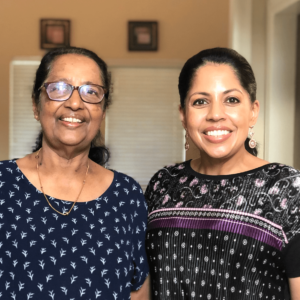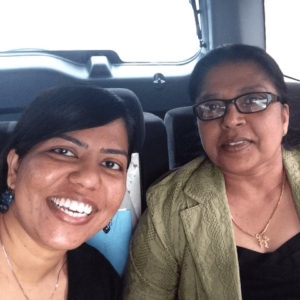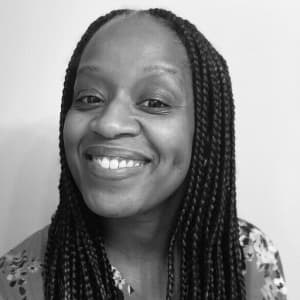Across Borders and Generations: Mother-Daughter Nursing Duos Share a Passion for Healthcare

Annamma Joseph recalls her mom, Gracy Vattakunnel, dressing for work each day. She admires her mother’s freshly pressed nursing uniform, the white lab coat with pockets hanging heavy with nursing supplies: alcohol swabs, Band-Aids, and tiny two-packs of 250mg Tylenol. She had it all. Even the simple white rectangular pin-on name badge with ‘RN’ after her mother’s name gave Annamma’s mother an air of authority.
Whether she knew it then or not, nursing was Annamma’s calling, too, just like her mom. But Gracy’s journey from India to the U.S. carried hardships and stress, language barriers, and a need to assimilate quickly. It also brought a secure income, allowing Gracy to raise her family and help her siblings also bring their families to the U.S. from India.
In 1965, President Lyndon B. Johnson signed a revised Immigration Act that would have a lasting impact on the U.S. While the previous act had based immigration quotas on nationality alone, prioritizing countries such as the United Kingdom, the new act based quotas on professional skills the nation was lacking — like nursing.
The 1960s and 1970s saw its first significant wave of South Asian and Southeast Asian nurses, and the trend has continued over the decades.
A nursing career is a respected profession for many immigrant families, providing job security and financial stability. Some begin their careers in their native country, complete required nursing courses, then work in local hospitals or clinics. Many will immigrate to the United States for additional career opportunities, often following in the footsteps of a family member, creating a multigenerational bond over the shared nursing journey.
Paving a Way for Future Nurses
Gracy’s journey from India to the U.S. for nursing is a shared experience by many. In 2018 alone, there were 1.5 million foreign-born healthcare workers in the U.S. Most work as doctors, nurses, and pharmacists. Becoming a nurse in immigrant families is often a tradition passed down among family members, specifically, mother to daughter.
Immigrants, especially from India, play a significant role in healthcare. According to the New American Economy Research Fund, India is the third most popular country representing healthcare workers in America. In 2018, 32,000 registered nurses (RN) were from India.
In this article, three mother-daughter nursing duos share their journeys to nursing. They discuss why they pursued nursing, the difference between their nursing experience in India and the United States, and provide advice to aspiring nurses beginning their nursing journey in the states and abroad.

Saly Jacob, RN, BSN, has been a registered nurse for 35 years. She has worked as a nurse in India and the United Arab Emirates before settling in the U.S. where she currently works at a cancer center. Jacob has worked in many different fields, including medical-surgical, orthopedics, emergency medicine, pediatrics, obstetrics/gynecology, and oncology. Her hobbies are cooking, gardening, and listening to music.
Sheby Jacob, RN, BSN, has been a registered nurse for four years. She is the youngest nurse in her immediate and extended family, which includes her mom, two aunts, and two cousins. She currently works at a COVID-19 testing site. Prior to that, she worked in the progressive care unit for adults and in pediatrics. Jacob is currently in graduate school to become a family nurse practitioner and loves to travel to new places.

Gracy Vattakunnel, RN, was a nurse for 50 years. She worked as a nurse in surgery, medical-surgical, psychiatric, the intensive care unit, and oncology. She served in different roles such as staff nurse, charge nurse, and nursing supervisor. In her retirement, she enjoys cooking and reading.
Annamma Joseph, RN, MSN, has been a psychiatric nurse for 23 years. Joseph currently works as the clinical team lead at a managed care organization that specializes in behavioral health. She loves to read, jog while listening to Bollywood music, cook keto/carnivore recipes, and take long walks listening to health podcasts and audiobooks.

Mariamma Mathew, RN, recently retired in June 2021, working almost 42 years as a nurse in India and in the U.S. Half of her experience was as a charge nurse of a telemetry medical-surgical unit. She has worked in various departments: newborn intensive care unit, operating room, labor and delivery, medical-surgical unit, and the emergency room. Apart from nursing, she loves taking care of her family (kids and grandkids), cooking, gardening, cleaning, knitting, and sewing.
Swapna Varghese, APRN, FNP-C, has 15 years of experience as a registered nurse, 10 of those years as a nurse practitioner. Varghese currently works in a corporate health setting managing their two onsite clinics for their employees. Apart from nursing, she loves reading, doing puzzles, and just being outdoors. She hopes to impart her love of nursing to her daughter and son.
A Call to Nursing Is an Individual One
Everyone’s call to nursing is different, but each is as ingrained as the other. For Saly Jacob, Gracy’s sister, her call was to follow in her older sister’s footsteps, and for Gracy, it was so she could “afford to buy beautiful sarees and purses” just like her aunt — who was also a nurse.
But for their sister-in-law Mariamma Mathew, at the time, it seemed the only option for Indian women who also wanted to provide for a family. Although their reasons were different, the calling was the same. The two sisters and their sister-in-law decided to become nurses.
Saly, Gracy, and Mariamma all emigrated from India to Texas. In 1975, a decade after President Lyndon B. Johnson signed the Immigration and Nationality Act of 1965, Gracy made her way to the U.S.
The sisters and their sister-in-law had their share of struggles and triumphs when they moved to continue their nursing careers in America. The three women’s daughters, Sheby Jacob, Annamma, and Swapna Varghese, noticed their mother’s efforts and felt inspired to pursue a nursing career of their own.
Growing up, the girls admired their mothers’ strength and resilience. They were impeccably dressed, too, wearing their nursing uniform with pride. Despite wanting their daughters to avoid nursing altogether, shielding them from the stress and hardships of what can be a challenging profession, Sheby, Annamma, and Swapna caught the nursing bug.
“Superwoman,” “brilliant,” and making nursing look “effortless” were all attributes the daughters used to describe their mothers growing up. And the admiration is mutual; their mothers are equally proud of their daughter’s accomplishments.
How Their Nursing Journey Began in the States
Saly, Gracy, and Mariamma started their nursing careers in India, eventually immigrating to the United States. Like many immigrant families moving to the U.S., they had no choice but to assimilate. Their first years were difficult. Overcoming language and cultural barriers was just the beginning.
Saly, a nurse for 35 years, describes her first years as a nurse as very challenging.
“I had to become acquainted with sociocultural preferences and practices,” she says. “I also had to improve my communication skills, deal with a completely new healthcare system and culture, and adjust to my new role.”
—
“That is a lot of pressure when you have a family to support in this new country.”
–Mariamma Mathew, RN
Nursing degrees from other countries often aren’t recognized in the U.S. Retaking courses or taking the nursing boards isn’t uncommon. After working as an RN in India for 10 years, in 1975, Gracy was hired in Texas as a graduate nurse. But Texas would not recognize her foreign nursing license from India until she earned a GED certificate, produced all available transcripts from India, and passed the Texas RN exam.
Eventually, she passed the National Council Licensure Examination and later earned an oncology certification while working as an oncology nurse.
Mariamma, a nurse for 42 years, had a similar experience. She worked as a patient care assistant while studying and passing the nursing boards. If she didn’t pass the exam after three tries, Mariamma would have to go back to school in the states, despite prior education in India.
“That is a lot of pressure when you have a family to support in this new country,” Mariamma says.
Nursing Differences in the States versus Abroad
Although faced with hardship and uncertainty, the sisters and their sister-in-law persevered. They immediately noticed nursing differences and similarities between the U.S. and India. A culture of family support was lacking in the U.S., and Mariamma found herself filling this role for her patients.
“In America, we see a lot of patients who are just waiting for their family to come,” Mariamma explains. “At that time, I would sit and spend time with them to help them pass their time. Whereas in India, there was always a family member present with the patient.”
Mariamma also noticed in India that doctors don’t interact with nurses as much as they do in the U.S. In America, she noticed doctors and nurses work together as a team.
“Nurses do not feel afraid to approach the doctors and give their own opinion regarding patient care, and doctors value the opinions of nurses here,” Mariamma says.
One similarity the sisters and their sister-in-law all agree on is that the nursing profession, in both countries, values integrity and a nursing code of ethics.
Gracy felt like nursing in India was the same as in the U.S as far as patient care and procedures are concerned. Having worked in India and the United Arab Emirates, Saly points out that “the overall ethics of nursing is the same wherever you go.”
Following a Passion and Discovering Nursing
For Sheby, Annamma, and Swapna, the path to nursing was more accessible to some than others. Sheby, the youngest nurse in her immediate and extended family, knew nursing was right for her. She loves helping people and wanted to find fulfillment in her career, along with the “comfortable lifestyle it produced.”
Annamma and Swapna, though, almost took another career path. Along with being deterred by her mother, who didn’t want any of her three daughters growing up doing bedside nursing because it was such hard work, Annamma had a passion for becoming a lawyer.
It wasn’t until her father expressed the abundant security and flexibility nursing afforded that Annamma began to consider nursing. In her junior year of high school, while discussing future careers in their family minivan, her father explained to Annamma how nurses will always have a job.
“He then said the magic phrase: If I went into nursing, I could always do nursing law,” Annamma says.
Annamma prayed about it just as her father had prayed for her. A year later, she made up her mind. Nursing was the right path.
Swapna, meanwhile, wanted to become a doctor. She describes her father as “forcing” or persuading her to become a nurse instead of a doctor. His reasoning was similar to Annamma’s father: Going into nursing had many benefits for nurses and would provide a “stable financial future.” Frustrated, Swapna leaned on her cousin, Annamma, for advice.
Just as Annamma’s father had “said the magic phrase,” Annamma explained to Swapna how nursing could be a gateway to pursue other passions. Her advice was to get a bachelor’s in nursing, since all premed programs require a bachelor’s anyway. This way, if Swapna didn’t get into medical school and liked nursing, she would already have a degree for the job.
Carving Their Own Path in Nursing
The daughters recognize they have more opportunities with their nursing careers than their mothers. One significant opportunity is the ability to pursue education beyond the undergraduate level. Annamma thinks if her mother had the opportunity to go back to school to be a nurse practitioner, she could have done it. She saw her mother had that kind of knowledge.
Sheby’s and Annamma’s nursing experiences didn’t match their expectations, now that they are advancing in their careers. Sheby, currently working at a COVID-19 testing site, thought it would be more manageable and less stressful since her mom “made it look so easy.”
Annamma, a psychiatric nurse, knew she had to work hard just like her mom. She soon realized nursing wasn’t just taking orders from doctors.
“You could make your own personal impact on that patient’s life outside of the orders and procedures,” Annamma says. “I also realized that there was more than just bedside nursing out there in the nursing field.”
On the other hand, Swapna knew from her mom’s work ethic that nursing was difficult, requiring both physical and mental exertion. As an advanced practice registered nurse, Swapna might forgo the physical demands of “pushing, pulling, and cleaning of patients” but focuses more on managing the profession’s mental and emotional demands.
A Nursing Legacy That Lives On
Saly, Gracy, Mariamma, Sheby, Annamma, and Swapna have experienced nursing full circle. Their mothers instilled a love and respect for the profession, and most importantly, taught them to put their patients’ care first.
—
“There is not a day where I take my job lightly. I know every day, even in clinic exam rooms, my decisions affect individual lives.”
-Swapna Varghese, APRN, FNP-C
“Just like my mom did, I wanted to portray to patients that I took care of myself and that I was willing to put in the same effort to care for them as well,” Annamma explains.
As a nurse practitioner, Swapna’s role changed from bedside nurse to provider . But supporting her patients has stayed the same.
“Now I am in an exam room, holding their hands and guiding them to the right medical choices for them,” she says. “I am still there advocating for them, and there is not a day where I take my job lightly. I know every day, even in clinic exam rooms, my decisions affect individual lives.”
Advice From Experienced Nurses to Aspiring Nurses
Over 150 plus years of combined nursing experience comes with some pretty good advice. Each daughter has advice for aspiring and new nurses.
For Sheby, she advises shadowing another nurse to help understand the workflow of bedside nursing.
“Nursing is not an easy field by any means, but it is worthwhile if you stick to it,” she says.
Annamma encourages people considering nursing to just “do it!” She emphasizes the great value and respect in having ‘RN’ behind your name.
“Your knowledge will be valued in this world,” she says. “Your expertise will be sought out in all different fields.”
She also emphasizes the flexibility nursing provides, especially because there are so many different types of nurses. Whether you want to spend time in direct patient care or decide later on to try your hand at teaching, both options are available. Nursing opens the door to other healthcare professions as well. Whether it’s pharmaceuticals, research, law, or managed care, nursing prepares the way.
For nurses abroad considering a career in the United States, Saly, Gracy, and Mariamma offer sound advice. Gracy stresses the consistency of nursing care for nurses working abroad, emphasizing that you will thrive as a nurse in the U.S if you are a nurse abroad.
“The U.S. is a wonderful place to work as a nurse, and you will get many opportunities to advance your career,” Saly says. “You also always have the ability to choose any specialty you prefer.”
Mariamma cites the struggles of transitioning into nursing in the U.S. such as retaking state boards before working. She encourages nurses to be patient and keep pushing on, even if they fail the state board exams one or two times. Learning the U.S. system takes time but is worth it.
Each mother-daughter duo finds the nursing profession rewarding. The ability to provide for their families, see patients’ conditions improve, and dive into their patients’ minds and emotions make the nursing profession worthwhile.
“Every day, I am able to work with a group of diverse nurses and the multidisciplinary team to provide evidence-based care to my patients,” Saly says. “Patient satisfaction is truly rewarding!”
Written by:

Joelle Jean has been a nurse for over 10 years and family nurse practitioner for over three years. She has a background in pediatric emergency room, labor and delivery, and primary care medicine. Today, she is a senior nurse writer for NurseJournal. She lives in New York with her husband, two boys, and cat, Zuzu.
You might be interested in

Ask a Nurse: In Which States Can I Endorse My Nursing License From Puerto Rico?
It’s definitely possible to transfer your nursing license from Puerto Rico, but it may require some extra work on your part, depending on where you want to move.

Ask a Nurse: Will My Non-Nursing Associate Degree Transfer Toward a BSN?
Ready to go from an associate to a bachelor’s in nursing? Learn how to transfer your non-nursing associate degree to a BSN.

16 Reasons to Choose a Career in Nursing
You can expect job stability and a variety of options when you become a nurse. Here are 16 reasons to choose nursing as a career.